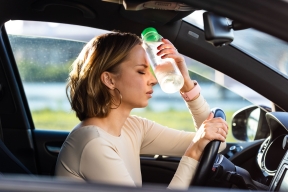Keep Cool to be Heart-Healthy in Extreme Heat
Courtesy of McLeod Heart & Vascular Institute
Record high temperatures this time of year are the norm in our region. The American Heart Association, a global force for longer, healthier lives for all, and the McLeod Heart and Vascular Institute are urging people to take extra steps to protect their hearts. Precautions are especially important for older adults and people with high blood pressure, obesity or a history of heart disease and stroke.
“Temperatures exceeding 100°F or even temperatures in the 80s with high humidity can produce a dangerous heat index that can be hard on the heart,” said Dr. Alan Blaker, Executive Medical Director, McLeod Heart and Vascular Institute. “Heat and dehydration cause the heart to work harder, with the body trying to cool itself by shifting blood from major organs to underneath the skin. This shift triggers the heart to pump more blood, putting it under significantly more stress. Hydration helps the heart more easily pump blood through the blood vessels to the muscles allowing the muscles to work efficiently.”
Recent scientific research shows that when temperatures reach extremes of an average daily temperature of 109 degrees Fahrenheit, the number of deaths from cardiovascular disease may double or triple. Another research study, featured at the American Stroke Association’s International Stroke Conference 2019, suggests that the more temperatures fluctuate during the summer, the more severe strokes may become.
While heat-related deaths and illnesses are preventable, more than 600 people in the United States are killed by extreme heat every year, according to the U.S. Centers for Disease Control and Prevention. While infants and the elderly are more vulnerable to problems from heat, extreme temperatures can cause health issues for anyone.
“Staying hydrated is key and avoid prolonged heat exposure. It is easy to get dehydrated even if you don’t think you’re thirsty,” said Dr. Blaker. “Drink water before, during and after going outside in hot weather. Don’t wait until you feel thirsty. And the best way to know if you are getting enough fluid is to monitor your urine output and make sure the urine color is pale, not dark or concentrated.”
The American Heart Association and the McLeod Heart & Vascular Institute suggests that everyone follows these top five hot weather precautions:
- Watch the clock: It’s best to avoid the outdoors in the early afternoon (about noon to 3 p.m.) because the sun is usually at its strongest, putting you at higher risk for heat-related illnesses.
- Dress for the heat: Wear lightweight, light-colored clothing in breathable fabrics such as cotton, or a newer fabric that repels sweat. Add a hat and sunglasses. Before you get started, apply a water-resistant sunscreen with at least SPF 15, and reapply it every two hours.
- Drink up: Stay hydrated by drinking a few cups of water before, during and after going outside or exercising. Avoid caffeinated or alcoholic beverages.
- Take regular breaks: Find some shade or a cool place, stop for a few minutes, hydrate and start again
- Follow the doctor’s orders: Continue to take all medications as prescribed.
Signs that you may be experiencing too much heat include headaches, heavy sweating, cold, moist skin, chills, dizziness or fainting, a weak and rapid pulse, muscle cramps, fast, shallow breathing, nausea, vomiting or both. If you experience these symptoms, move to a cooler place, and cool down immediately by dousing yourself with cold water and re-hydrating. You may need to seek medical attention.
-
McLEOD REGIONAL MEDICAL CENTER FLORENCE
843-777-2000 -
McLEOD DARLINGTON
843-777-1100 -
McLEOD DILLON
843-774-4111 -
McLEOD LORIS
843-716-7000 -
McLEOD SEACOAST
843-390-8100 -
McLEOD CHERAW
843-537-7881 -
McLEOD CLARENDON
803-433-3000



-
McLEOD REGIONAL MEDICAL CENTER FLORENCE
843-777-2000 -
McLEOD DARLINGTON
843-777-1100 -
McLEOD DILLON
843-774-4111 -
McLEOD LORIS
843-716-7000 -
McLEOD SEACOAST
843-390-8100 -
McLEOD CHERAW
843-537-7881 -
McLEOD CLARENDON
803-433-3000
 Find a Doctor
Find a Doctor  Locations
Locations  Services
Services 